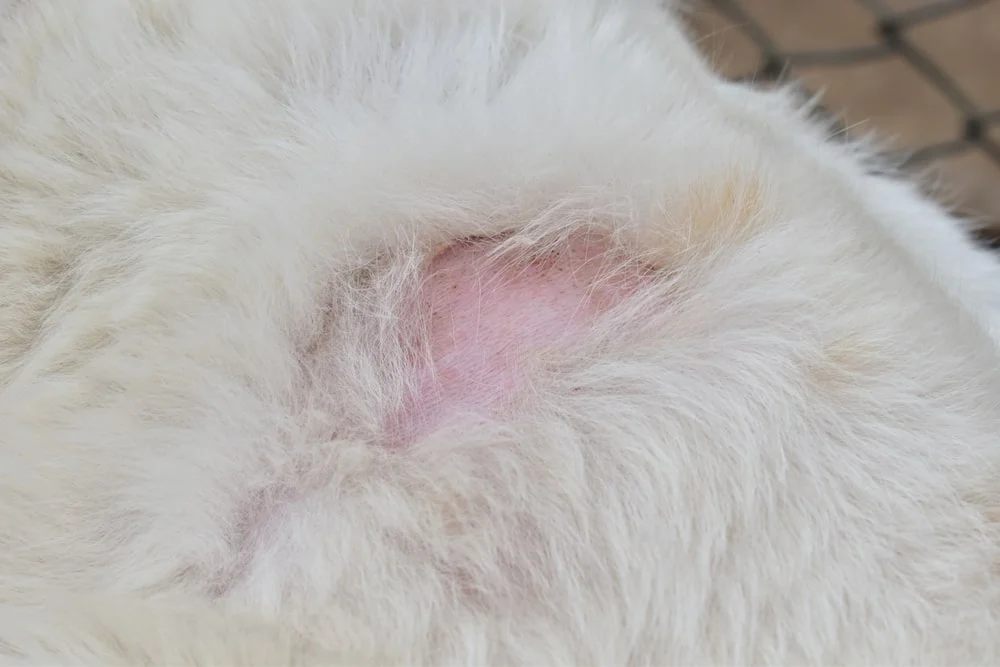PET HEALTH
Cushing’s disease, also known as hyperadrenocorticism, is a common hormonal disorder found in both humans and animals.1 Hyperadrenocorticism refers to an overactive adrenal gland. Adrenal glands are situated near the kidneys and play a crucial role in regulating major hormones, like cortisol.1
Dogs with Cushing's disease produce an excessive amount of cortisol, which can cause kidney damage and diabetes, making your dog very sick.1
Are you still scratching your head? Let’s discuss this disease and why it’s so important to catch the signs early.
What Are the Symptoms of Cushing’s Disease in Dogs?
Here are the most common symptoms of Cushing’s disease in dogs:1,2
- Excessive thirst
- Frequent urination
- Increased appetite
- Heat avoidance
- Lethargy
- A bloated “potbelly”
- Panting
- Obesity
- Weakness
- Hair loss
- Thin skin
- Easy bruising
Speak to your veterinarian immediately if you notice any of these symptoms, so they can begin testing for the disease.
What are the first signs of Cushing’s disease?
Recognizing the early signs of Cushing’s disease is crucial for timely intervention and effective management. Some of the early signs, such as frequent urination, appetite changes, and hair loss might be dismissed as typical signs of aging. However, pet parents must remain vigilant, as these signs could indicate underlying hormonal imbalances associated with Cushing’s disease.
What Causes Cushing's Disease in Dogs?
There are different types of Cushsing’s disease in dogs, each with its own set of causes and contributing factors. Depending on which type your dog has, the treatment and prognosis may vary. The three types of Cushing’s disease are:2
- Pituitary-dependent Cushing’s disease: This is caused by a benign or malignant tumor on the pituitary gland at the base of the brain.
- Adrenal-dependent Cushing’s disease: This is caused by a benign or malignant tumor of the adrenal gland.
- Iatrogenic Cushing’s disease: This is caused by excessive cortisol production stemming from the long-term use of steroids (typically used as a treatment for other medical issues).
Some breeds of dogs — like miniature poodles, boxers, and beagles — have a higher likelihood of developing Cushing's disease. Additionally, adult or senior dogs make up the majority of pets that get Cushing’s disease through tumors.1 As you can imagine, tumors negatively affect the way the adrenal glands perform in the body. If the tumors are malignant, cancer can spread to other organs.
How Is Cushing’s Disease Diagnosed?
Your vet may need to conduct several tests to determine if your pup has Cushing’s disease, as this disorder is notoriously difficult to diagnose. Some tests, like a blood test or urinalysis, may need to be repeated every 3 – 6 months if the tests are inconclusive or if symptoms disappear.1 Repeat tests will make sure something wasn’t missed from the first samples.
Two other common tests your vet may perform are an adrenocorticotropic hormone (ACTH) stimulation test and a low-dose dexamethasone suppression (LDDS) test.2 Both tests are designed to measure the level of excess cortisol in the body, along with how your dog’s body responds to hormones.
If all the test results lead to your dog potentially having Cushing’s disease, then your vet’s goal is to figure out what’s causing the disease. There are several diagnostic imaging tests that your care team may use to get a good look at your dog’s adrenal glands, like X-rays, ultrasounds, computed tomography (CT) scans, or magnetic resonance imaging (MRI).1,2 All of these tests together will guide the next steps toward getting your dog healthy.
What Are the Treatment Options for Cushing’s Disease in Dogs?
While surgery is a treatment option for adrenal tumors, vets typically choose to treat Cushing’s disease with medication because surgery can be extremely risky due to the location of the tumor near vital organs. Additionally, surgery on pituitary tumors isn’t currently a widely available option.3 If the tumor is benign (meaning not spreading or cancerous), then administering medication and monitoring the disease may be the best option for your dog.
Treatments will typically consist of one of the following:3
- Vetoryl (trilostane): This is the only FDA-approved drug used to treat both pituitary-dependent and adrenal-dependent Cushing’s disease.
- Anipryl (selegiline): This drug is FDA approved but only recommended for specific cases of pituitary-dependent cases of Cushing’s disease.
- Lysodren (mitotane): This is a human chemotherapy drug that destroys the top layer of the glands. This option requires a lot of time, care, and monitoring as it can cause serious side effects.
Treating iatrogenic Cushing’s disease can be more challenging, as it involves discontinuing the administration of the steroid medication. This process must be done gradually to avoid complications. However, unfortunately, the disease you were initially treating may come back. And because the steroid might have harmed the adrenal gland, additional treatment may be required to restore normal hormone levels.2
A MetLife Pet Policy May Help Cover Cushing’s Disease Costs
What Is the Life Expectancy of Dogs With Cushing’s Disease?
Cushing’s disease is normally a lifelong condition that requires ongoing management to control symptoms and maintain your dog’s health. If left untreated, the disease can cause various long-term effects, such as diabetes, hypertension, and bladder stones.4
The life expectancy of a dog with pituitary-dependent Cushing's disease is generally around 2 years. Treatment with radiation or surgery may extend their lifespan to 2 – 5 years. However, dogs that undergo surgery for an adrenal gland tumor may live for about 18 months.1
Cushing’s disease can be difficult to treat, but it’s not impossible. If caught early, and the tumors are small, benign tumors can potentially be removed or shrunken with careful treatment and monitoring at the vet’s office.4
Can Cushing’s disease be prevented?
There’s no known way to prevent pituitary and adrenal gland tumors, but you can try to minimize the risk of your dog developing iatrogenic Cushing’s disease by avoiding long-term use of steroids.4
Although prevention may not be guaranteed, lifestyle changes can often help lower the risk for many types of cancers. Try some of these strategies to improve your dog's overall health:5
- Feed your dog a well-balanced diet.
- Ensure your dog gets plenty of exercise.
- Schedule regular checkups with your vet.
- Administer your dog’s medications under the supervision of your vet.
Dog Insurance Can Help You Treat Cushing’s Disease
Cushing’s disease can be a life-changing and stressful diagnosis for pet parents. And while there's no cure for the disease, effective treatment options are available to help improve your dog’s quality of life. The cost of treatment for Cushing’s disease can vary, but luckily, pet insurance can help. With a pet insurance policy, you can get reimbursed6 for the costs of covered diagnostic tests, medications, and more.
The good news is if you have dog insurance, you don’t have to compromise on the care your dog receives. Take a moment to figure out how pet insurance works, or get started today with a free quote from MetLife Pet Insurance, winner of the Pet Insurance of the Year Award7 in the 2024 Pet Independent Innovation Awards Program.
We Can Help Cover Vet Bills While You Focus on Your Dog’s Care
855-270-7387



